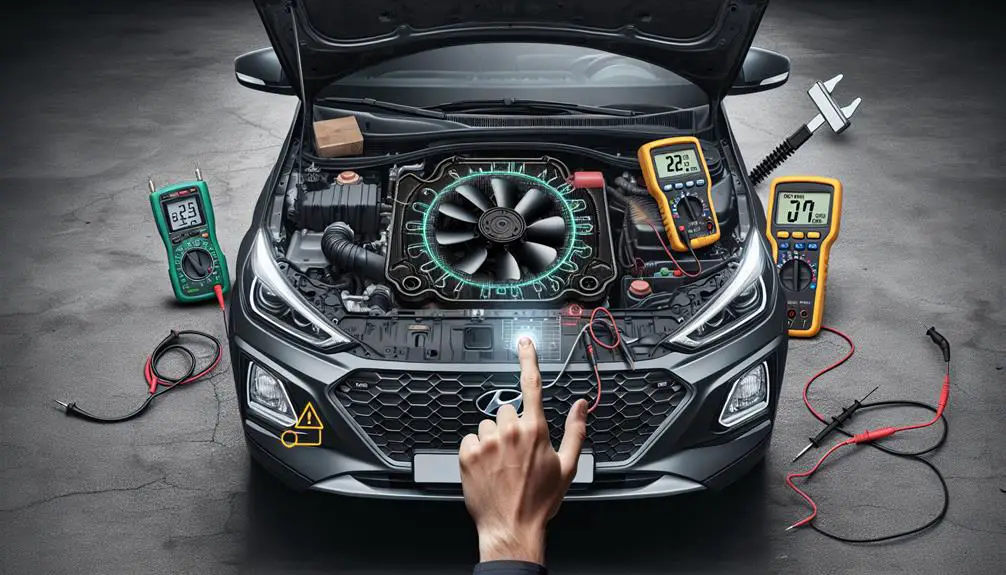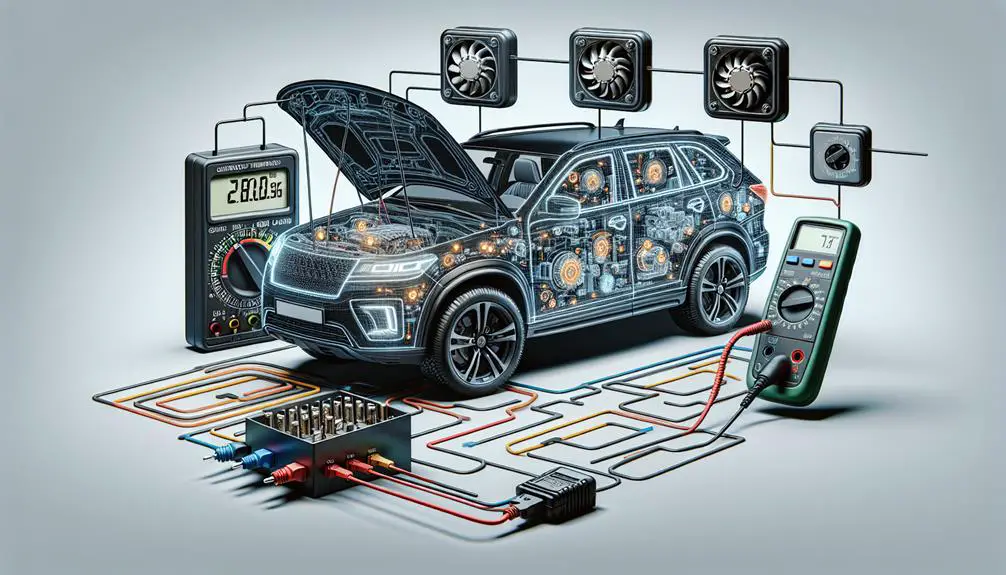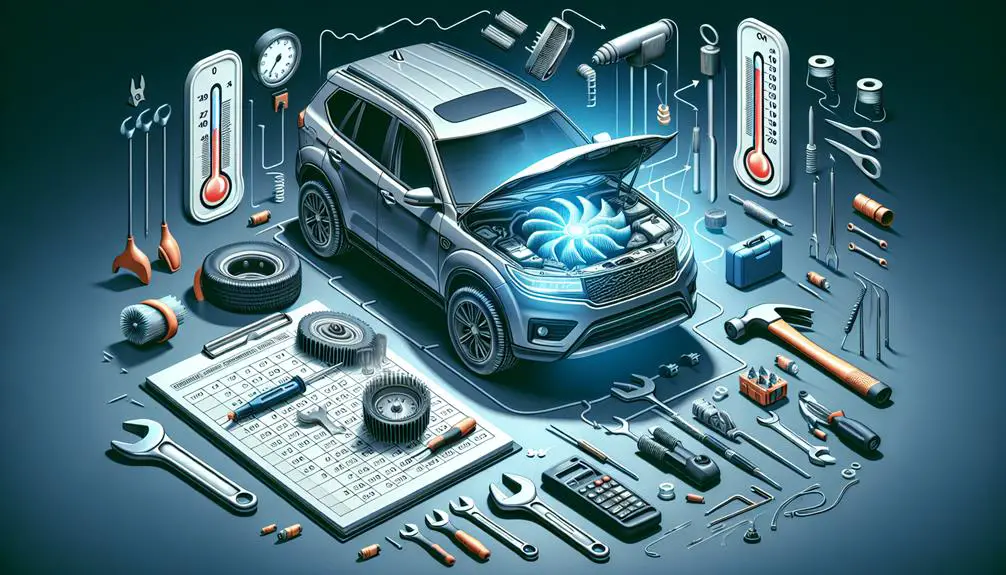Hyundai Kona's cooling fan not working can be due to simple fuse issues or complex electrical malfunctions.
In many cases, a blown fuse is the culprit behind a non-functioning cooling fan.
If the fuse is intact, the issue may lie within the electrical system, such as a faulty fan motor or a malfunctioning temperature sensor.
It is advisable to have a professional mechanic diagnose and repair the problem to ensure the cooling system functions properly.
Identifying the Problem

Several Hyundai Kona owners have reported issues with the vehicle's cooling fan, noting it may fail to activate when needed. If you're driving a Kona, it's important to recognize when you're facing this problem to prevent potential damage to your engine due to overheating.
To start with, you'll notice your car's temperature gauge climbing higher than usual, especially during idle conditions or in heavy traffic where airflow is limited. Another telltale sign is the lack of warm air being expelled from the vehicle's vents. This is since, without the fan pulling air through the radiator to cool the engine, the heating system can't effectively warm the air for the cabin.
Moreover, you might hear unusual noises coming from the engine bay. While the cooling fan is typically quiet, its failure to activate might be accompanied by clicking sounds or silence when you expect it to kick in.
It's crucial to address these signs promptly. Ignoring them could lead to more severe issues, like engine overheating, which could sideline your Kona and lead to costly repairs. By staying vigilant, you can catch this issue early and seek professional help to ensure your vehicle remains in top condition.
Common Causes
Comprehending the reasons behind your Hyundai Kona's cooling fan issues can help you pinpoint the problem more effectively. Often, the root cause is as straightforward as a blown fuse. Your vehicle's fuse box houses these critical components, safeguarding the electrical circuitry. If a fuse blows, it interrupts the power supply to your cooling fan, resulting in it not working.
Another common culprit could be a malfunctioning coolant temperature sensor. This sensor monitors the engine's temperature and signals the fan to kick in when it gets too hot. If it's not working correctly, your fan won't know when to start, leading to overheating issues.
Additionally, a faulty cooling fan relay can cause your fan to remain inactive. The relay acts as a switch, providing power to the fan when needed. If it fails, the fan won't receive the signal to start.
Diagnostic Steps

To diagnose your Hyundai Kona's cooling fan issue, you'll initially need to check the fuse box for any blown fuses. This is a simple step that could reveal the root of the problem without needing to investigate further into more complex diagnostics. If you find a blown fuse, replacing it might solve your issue, but remember, it's important to figure out why it blew to prevent future problems.
Next, you'll want to inspect the cooling fan's wiring and connectors for any signs of damage or corrosion. Look closely for any frayed wires or loose connections that could interrupt the electrical flow to the fan. It's these little issues that often go unnoticed yet can cause significant problems.
Don't forget to test the cooling fan relay, which is a common culprit when fans stop working. A faulty relay can prevent power from reaching the fan, so testing it with a multimeter can help you pinpoint if this is where the issue lies.
Repair and Replacement
After identifying the cause of your Hyundai Kona's cooling fan issue, it's time to focus on the repair or replacement process. Depending on what you've found during your diagnostics, you'll either be looking at a quick fix or a more involved replacement job. Here's what you need to know:
- Check the Warranty: Before diving into repairs, see if your Kona is still under warranty. If it is, you might get the repair or replacement covered by Hyundai, saving you money and hassle.
- Gather Your Tools: If you're tackling this job yourself, you'll need a set of basic tools. This usually includes screwdrivers, pliers, and possibly a socket set. Make sure you have the right tools before starting to avoid any mid-repair runs to the hardware store.
- Consider Professional Help: If the repair seems out of your league or if you're not comfortable handling it, consider taking your Kona to a professional. A certified mechanic can ensure the job is done right, potentially saving you from future issues.
Preventative Measures

Taking preventive measures can greatly reduce the likelihood of your Hyundai Kona's cooling fan running into issues down the line. It's all about staying ahead and making sure your vehicle remains in top condition. You'll save yourself time, money, and the stress of sudden breakdowns. Here's a straightforward guide to keep your cooling fan functioning optimally.
| Action | Benefit |
|---|---|
| Regularly check fan operation | Guarantees fan activates when needed |
| Inspect cooling system monthly | Identifies leaks or blockages early |
| Clean debris from the radiator | Prevents overheating and fan overworking |
| Schedule annual professional inspections | Catches potential problems early |
Conclusion
You've now got a clear roadmap to tackle the issue with your Hyundai Kona's cooling fan. From identifying common causes to following precise diagnostic steps, you're well-equipped to fix the problem.
Whether it involves a simple repair or a full replacement, you know exactly what to do. Don't forget, taking preventative measures can save you from future headaches.
Stay proactive about your vehicle's maintenance to keep your Kona running smoothly and efficiently.